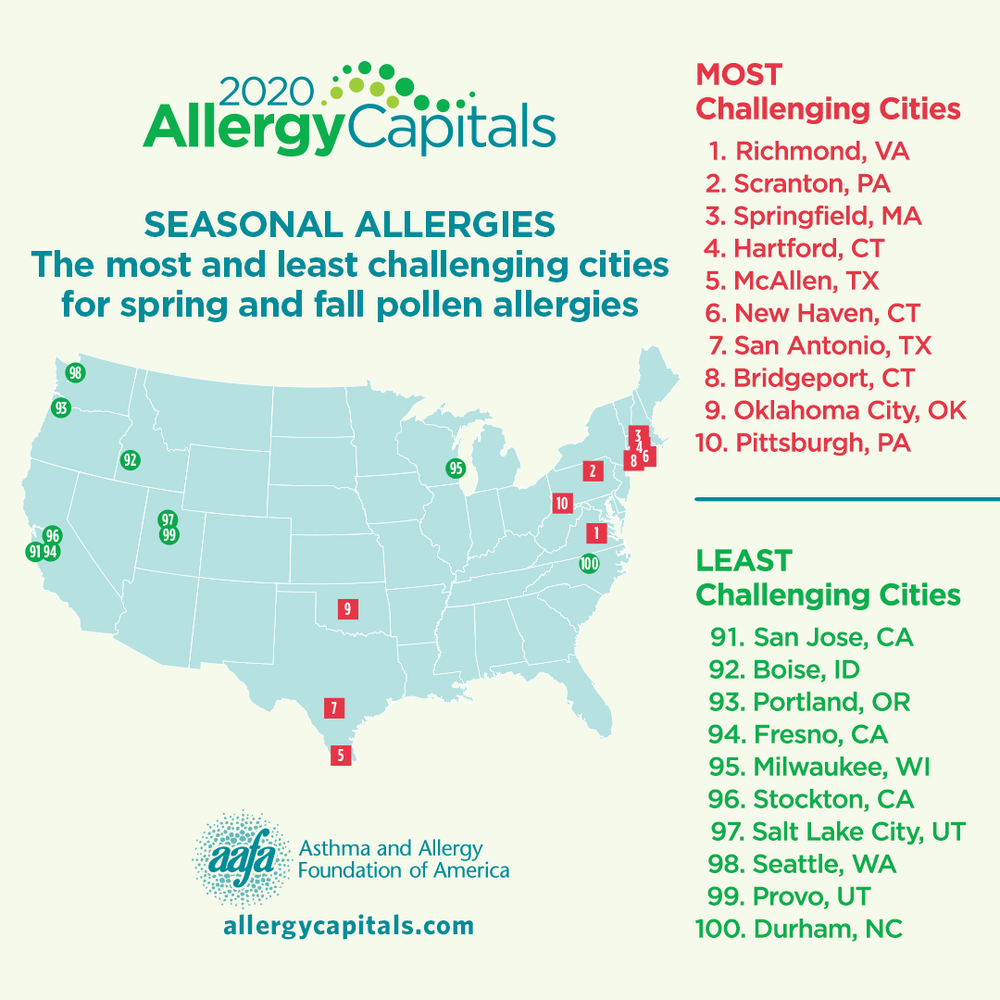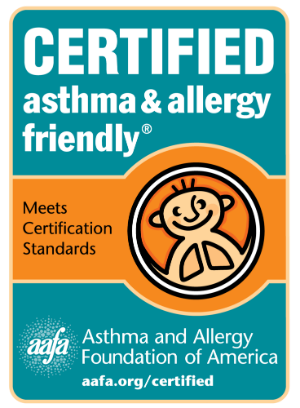Research
2020 Allergy Capitals™
It’s the season for itching and sneezing! If you live in one of the top 2020 Allergy Capitals™, use AAFA’s tips to reduce your contact with pollen and improve your quality of life.

More than 50 million Americans are living with nasal allergies and about half of those are caused by seasonal allergies. AAFA’s yearly Allergy CapitalsTM report explores the 100 cities* where people are most affected by spring and fall allergies.
The report looks at three important factors:
- Pollen counts
- Use of allergy medicine
- Number of board-certified allergists
This year’s report named Richmond, Virginia, as the top Allergy Capital™ due to its:
- Higher than average spring and fall pollen
- Higher than average allergy medicine use
- Fewer board-certified allergists
*Data was studied from the 100 most-populated metropolitan areas.
The top 10 most challenging places to live with seasonal allergies are:
- Richmond, Virginia
- Scranton, Pennsylvania
- Springfield, Massachusetts
- Hartford, Connecticut
- McAllen, Texas
- New Haven, Connecticut
- San Antonio, Texas
- Bridgeport, Connecticut
- Oklahoma City, Oklahoma
- Pittsburgh, Pennsylvania
The top 10 least challenging places to live with seasonal allergies are:
- San Jose, California
- Boise, Idaho
- Portland, Oregon
- Fresno, California
- Milwaukee, Wisconsin
- Stockton, California
- Salt Lake City, Utah
- Seattle, Washington
- Provo, Utah
- Durham, North Carolina
See full list of top 100 most challenging cities to live in with allergies. 

Where Can I Get Full List of Top 100 Cities in 2020 Allergy Capitals™ Report?
2020 Allergy Capitals - 100 Metro Areas and Regional Rankings 
Press Release 
Get Seasonal Allergy Relief No Matter Where You Live
In the spring, the warm weather will bring people outdoors to face one of the season’s biggest problems: tree pollen.
In the fall, pollen from weeds cause the most seasonal allergy symptoms. Ragweed pollen allergy triggers allergic symptoms in as many as 23 million people in the United States.
Common symptoms of seasonal allergies include:
- Runny nose
- Itchy eyes
- Sneezing
- Congestion
The spring allergy season begins with pollen released by trees. Grass pollen follows later in spring into summer. Then in the late summer and early fall, weed pollen can make you miserable, while mold hides out in damp places like fallen leaves and soil.
There are apps you can use to watch your area’s pollen. On days that counts are high for what you are allergic to, take these actions to reduce your contact with pollen:
- Check pollen counts daily, and plan outdoor activities on days when pollen counts are lower.
- Keep windows closed.
- If possible, use central air conditioning with a CERTIFIED asthma & allergy friendly® HVAC filter.
- Wear sunglasses and a hat when outdoors.
- If cutting grass, working with plants or raking leaves, wear an N95-rated mask, gloves and sunglasses/goggles.
- Take a shower and shampoo your hair before going to bed.
- Change and wash clothes after outdoor activities.
- Dry your laundry in a clothes dryer or on an indoor rack, not on an outdoor line.
- Wipe pets off with a towel before they enter your home.
- Remove your shoes before entering your home.
- Wash bedding in hot, soapy water once a week.
- Use a nasal rinse to flush out inhaled pollen.
- Over-the-counter or prescription allergy medicines – such as antihistamines
- Nasal corticosteroid sprays
- Immunotherapy – allergy shots or tablets for long-term treatment to reduce how severe your allergic reactions are
Talk with your doctor before allergy seasons begins to discuss which treatment is right for you.
Our Allergy Capitals™ report is an independent research project of AAFA.
